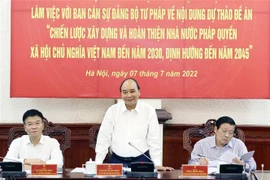Giang stressed that in the context of many complicatedconflicts taking place in the world, international law and the basic principlesof the UN Charter have always been the basic foundation of the internationalsystem.
He called on countries to respect the principle of peacefullysolving international disputes and upholding the role of internationalarbitration bodies in the peaceful settlement of disputes as well as promotingthe rule of law at the international level.
It is necessary to promote the rule of law in differentregions, and Vietnam is making efforts with ASEAN countries to build apeaceful, stable and prosperous Southeast Asia.
He emphasised that Vietnam maintains concerns aboutrecent complicated developments in the East Sea, as these actions reduce trustamong countries, increase tensions and affect peace, security and stability inthe region.
The Vietnamese diplomat called on all parties concerned toabide by international law, especially the 1982 UN Convention on the Law of theSea (UNCLOS), with full respect for diplomatic and legal processes.
On the occasion of the 40th anniversary of the adoption ofUNCLOS, Ambassador Giang stressted that Vietnam, as a founding member of the UNCLOSGroup of Friends, and nearly 120 other member countries are actively working toenhance the understanding about and compliance with the convention - animportant international document known as the “Constitution of the Oceans” andthe legal framework for all activities at sea.
He also affirmed that Vietnam is carrying out judicialreforms, and strengthening the legal system to build a rule-of-law state, andwill work closely with the UN and other partners to promote and ensure strongeradherence to the rule of law at the national and international levels.
At the debate, participants agreed that the rule of law anddevelopment were closely related and played an essential role in realisingsustainable development goals, ensuring human rights and maintaininginternational peace and security, contributing to the implementation of thecommon agenda based on the principle of respecting national sovereignty./.





























